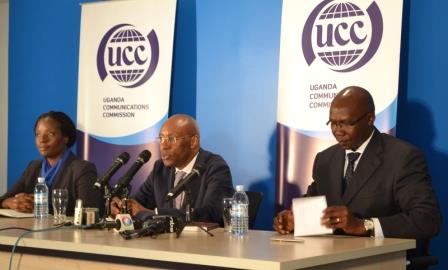Uganda Communications Commission (UCC) has explained that telecom companies are working closely with National Identification and Registration Authority (NIRA) to enforce verification and validation of the simcard registration process.
This follows claims by civil society organizations that UCC was illegally providing individual data to these companies.
In a detailed statement, UCC communications manager Pamela Ankunda said that, “the communications Sector UCC has just issued guidelines to all telecom companies in Uganda: Among these, all new SimCards must be registered, National IDS and passports as the only documents at registration, and, a strict warning to stopSim Card vending. We are monitoring compliance and it is good.”
Adding that, “In a bid to enforce verification and validation of the registration process, telecom companies must work with the National Identification and Registration Authority (NIRA), the body responsible for the data bank.”
Below is her full statement
The communications Sector UCC has just issued guidelines to all telecom companies in Uganda: Among these, all new SimCards must be registered, National IDS and passports as the only documents at registration, and, a strict warning to stopSim Card vending. We are monitoring compliance and it is good.
In a bid to enforce verification and validation of the registration process, telecom companies must work with the National Identification and Registration Authority (NIRA), the body responsible for the data bank
However, a few misconceptions have come up and we would like to provide clarification.
In 2015,the Registration of Persons Act 2015 was enacted. This law was meant to harmonize and consolidate registration of persons. Itcreated the National Identification and Registration Authority (NIRA), provided for registration of individuals, provided for issuance of national identification cards & aliens identification. It also put an end to simultaneous registrations on the account that data could be used by the Government for various reasons. Section 2 of this Act clearly spells out its purposes; that is, to remove duplication from the processes and laws relatingto registration of persons.Furthermore, Section 2 (e) provides for access and use of the information containedin the national identification register.
This is the matter we are addressing today, regarding the issue of SimCard registration by telecoms and data access for verification.
Section 65 and 66 support the UCC directive since it guides on who can use information in the National Register and for what purposes; and this among others includesaccess for registration and National Security purposes.
Section 66 of the Act says that any Ministry, department or agency of government or any other institution providing a public service shall require a person accessing the service to produce a national identification number or national identification card or alien’s identification number or alien’s identification for among other reasons, employment, opening of bank accounts;all consumer credit transactions; financial services and registration services. Telecoms are providing mobile money services that require our registration. What NIRA thus does is not give out data, but verify with the Ministry, agency or Department requesting.
By the way, this is nothing new. Early last year, Ministry of Public Service wanted to validate data of all public servants. The only way to do it was to ask NIRA if person X was in the data base, and if indeed person X was of a certain age-(the retirement question).In short, Public Service through the validation exercise asked NIRA to verify data. NIRA verified, but didn’t give full access.
In another scenario, lately banks have been asking us for our National IDS upon opening a bank account, and or, getting a loan. When we submit our cards willingly; banks are doing it for verification purposes. In the case of sim card registration, we need to look backin 2013 registration process. We attached all kinds of documents including those we picked at ‘nasser road’ and the “to whom it may concern’ letters addressed to no one in particular, school IDS that had long expired and all kinds of documents. Most-if not all, are not verifiable, but yet amongst us, are criminals and criminal minded elements. As a regulator, the Uganda Communications Commission tasked telecoms to clean upby verifying who the users of these SimCards are. We have the backing of the security fraternity who must ensure our country remains safe, must stop bank frauds, must stop simswaps, etc
The process is that telecoms will be giving NIRA the information they have collected, such that NIRA compares with what it has in its data base. The other way is by use of short codes,that either way, still lead to the interface with NIRA. Where there is similarity of simcard holder X as a duly registered citizen or resident alien, NIRA will give feedback. Here though is the catch. If Telecoms send information to NIRA and there is a difference, or details don’t exist in the data base, telecoms will ask you to go to their nearest point of registration and take it up there. The modalities of how much Telecoms will pay to NIRA for that process are discussions being discussed with NIRA.
Today, telecoms are running adverts that asking an individual to carry your National ID or passport as an identity for SimCard Registration. For those who have registered during the previous exercise, you don’t have to undergo another registration process unless the documents are false. Telcoms are conducting backroom validation against the NIRA data base. It is only when it is proven that there is a mismatch that you will be called upon to verify your identity. You can only be worried if you are a criminal.
